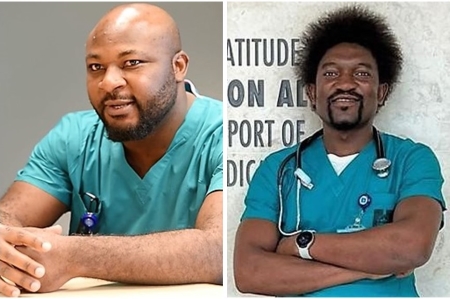
By Guest Columnist Hirsch Goodman
The ethos of Israel being a light unto the nations was made tangible to me recently when I walked through the corridors of Hadassah Hospital Ein Kerem in Jerusalem to meet two of six doctors from Cameroon currently doing their residencies at the hospital.

Doctors Fung Holgar Mua and Carlson Asanghanwa opted to specialize in anesthesia and critical care; the others are working in the departments of ophthalmology, ear, nose and throat, and orthopedics. All will spend six years with the Hadassah Medical Organization.
Despite the mineral wealth and other resources, the country has a life-expectancy rate of around 60 years of age, a high infant mortality rate, and endemic diseases, specifically HIV and malaria. There is just about one doctor, very few specialists among them, per 10,000 people.
There are nine medical schools with an intake of 800 students per year out of 6,500 applicants and once qualified, these doctors are expected to pay the country back for their seven-year education by working as general practitioners in rural facilities with limited resources.
The first contacts between Hadassah and Cameroon go back to the 1990s with two ophthalmologists being trained in Hadassah. They helped to train many local ophthalmologists on their return to Cameroon. In 2012, three doctors and a nurse from Hadassah collaborated with a local team at the Bamenda Regional Hospital to perform free cataract and oculoplastic surgeries. As a result, Doctor Nche Eleanor was a part of the local team and was offered a chance to move to Jerusalem, for her specialist studies at Hadassah. During her studies in Hadassah, she became an unofficial ambassador for the hospital, encouraging others to follow in her footsteps, doctors Holgar Mua and Carlson among them.
And like her, the other doctors will be returning home to Cameroon to practice within Cameroon’s medical system, their commitment amplified, they said, by their time at Hadassah in Jerusalem, a long way from home but where they feel very much at home.

“It is unbelievable,” said Holgar Mua, “how despite the seeming political turmoil outside, once inside Hadassah’s doors, one senses nothing but dedication to duty. Jews, Arabs, and people from all over the world, are here to heal. It is truly remarkable,” he said, “and something I am going to take home with me.”
Asanghangwa called it a “melting pot” that had given him an “enriching experience” he could only have dreamed of before coming here.
“I have met and learned from top-class professionals from all over the world in addition to my Israeli colleagues, and have made friendships that will last a lifetime.”
As we spoke over coffee on a rainy day both recounted their experiences and, each in their own way, said the past six years have been some of the best six years of their lives both professionally and personally.
“Being at Hadassah and seeing the interaction among people of all faiths, nationalities, outlooks, and beliefs working together for the common good has deepened my moral commitment to returning home, as well as my medical knowledge,” said Holgar Mua.
And when asked if, given the chance, he would make the same choice to come to Hadassah again, Carlson Asanghanwa answered without a moment’s hesitation:
“Of course, I would. I have worked with incredible people and learned an immense amount. As importantly,“ he said, “Hadassah is a magnet for doctors from all over the world and I now have a network of colleagues that will be of benefit beyond what I have learned here. It is one of the best decisions I have ever made and will be sure to spread the word among my colleagues back home.”
Once again, Hadassah is a light unto the nations, indeed.
Photo caption: (l – r) Doctors Fung Holgar Mua and Asanghangwa Carlson
